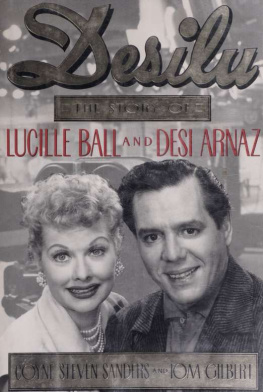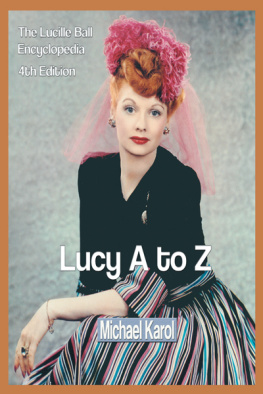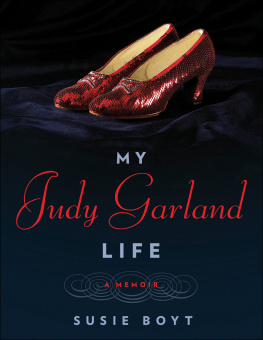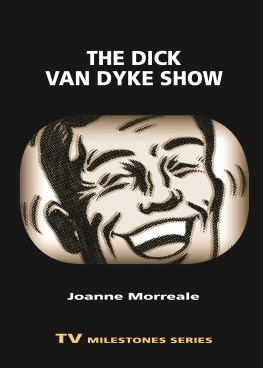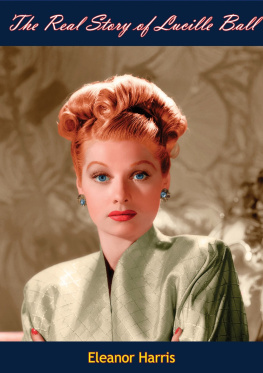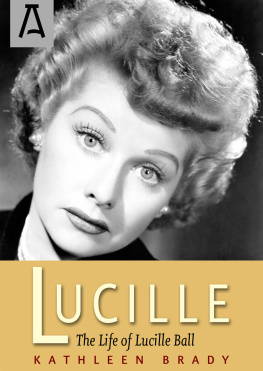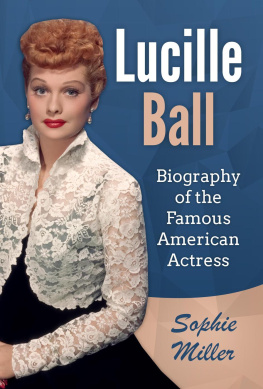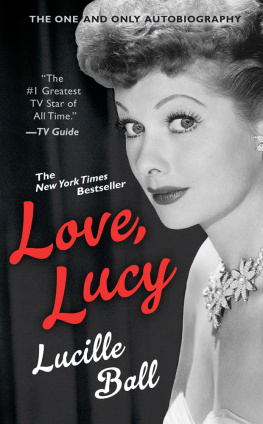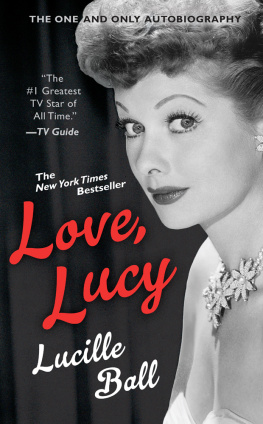This book made available by the Internet Archive.
For Richard and Margaret OMalley
c.s.s.
For Bert and Jack
T.G.

A \ .
A.
"What does Desilu stand for? It sounds like a past participle of a French verb."
Thornton Wilder

Thomas J. Watson Collection




Oae
I am a real ham. I love an audience. I work better with an audience. I am dead, in fact, without one.
Lucille Ball, 1953
/he year 1947 was a time of great uncertainty for thirty-six-year-old Lucille Ball. A fourteen-year career in mostly mediocre motion pictures had left her hnancially rewarded but artistically frustrated. With a him actresss greatest opportunitya shot at major MGM stardombehind her, not exactly a failure but certainly not a success, she was faced with the brutal reality that odds were she had nowhere to go but down. With no him offers forthcomingand almost against her willLucille would make what would prove to be a very signihcant choice; to go legit, or perform in a play, onstage, an area where she had had very little experience.
Dream Girl, a Walter Mitty-esque mixture of comedy and fantasy written by Elmer Rice, was the vehicle that would bring Lucille to the boards. A smash hit on Broadway during the 1945-46 season, it presented the vivid romantic daydreams of a prim bookshop owner. The tour-de-forceand very demandingpart of Georgina Allerton was a plum role Rice had concocted as a gift, of sorts, for wife Betty Field. Lucille, however, would make her debut as Georgina in a less auspicious place than Broadwayshe would bow in a summer-stock production one hundred miles away, in Princeton, New Jersey.
The events leading up to Lucilles appearing in Dream Girl, however, were not quite the result of her own determined efforts for a stage career. In the early months of 1947, Herbert Kenwith was scouting talent for his upcoming production of the show, which would reopen the McCarter Theater under his auspices that June as part of the Princeton Drama Festival. Lucille had often complained that she was a second-string him actress, losing good parts to Ann Sothern and Ginger Rogers. True to form, she was not Kenwiths hrst choice for the stage; he originally opted to cast the then-popular Martha Scott. When that actress proved unavailable, the young director happened to read that Lucille was visiting New York, and began a zealous pursuit.

SteuCK S^LndenA and (fddent
Lucille was staying at the posh Hampshire House on Central Park South, so Kenwith phoned her suite, only to be told by her maid, Harriet, that Miss Ball was out shopping. When Harriet mentioned that Lucille would return to the hotel very briefly to dress for the theater, Herbert asked which play she would be attending. Harriet revealed Lucilles theater-going plans for the next three nights.
Kenwith hatched a plan. He called in some favors and managed to secure a house seat for each play on the same night Lucille planned to attend. House seats are usually down in front, and I assumed she had house seats, too, so Id be sitting near her, recalls the director. As it turned out on that first night, 1 was not sitting directly in front of her, but sort of checkerboard in front of her. I kept turning around and looking at her. Every time Id look at her, shed catch my eye and look away. She was becoming annoyed, but 1 wanted her to remember my face. During intermission, we both walked out to the lobby. I kept moving around in front of her. The second night, 1 was seated about three rows away, so I made a deliberate error and walked into the row in front of her, as if I were looking for my seat. This time I said hello to her. She said hello, nodded her head, and ignored me. The third night, in the lobby, she grabbed me by the arm and said, Who the hell are you? I said, Im Herb Kenwith. You dont know it yet, but youre going to do a play for me.
Youre out of your mind, she told him. Im not going to do a play for anybody.
Yes, you are. You are going to do a play.
What play?
Its called Dream Girl.
Oh, 1 wouldnt do that said Lucille, who had seen the Broadway
production. Its longer than Hamlet.
Despite her protestations, Lucille was intrigued by Kenwith and invited him to lunch with her in her suite the following afternoon. We had lunch. There were a lot of carrots on the plate. I commented that the carrots matched her hair. Well, she said, That was the inspiration for the hair. At that moment, two local reporters arrived and began to interview Lucille, asking her what she was doing in New York. When at first she hesitated, one reporter said, We cant believe youd come to New York without any plans. Is there some plan that you have?
Trapped, Lucillemerely in New York on pleasurestammered, Well, as a matter of fact. Im going to do a play. The announcement surprised Kenwith as much as it did the newspapermen. Lucille deftly tossed the ball in Kenwiths direction. By coincidence, this is my pro
^e4itu
1 1
ducer. Hes going to produce and direct a play for me. Kenwith announced that Miss Balls upcoming play would be Dream Girl The next day 1 got a copy of the paper and went to Actors Equity. 1 said, 1 dont have a contract with Miss Ball, but will this interview constitute a contract? They told me that it might not stand up but, on the face of it, it was like a contract because she was quoted about doing the play and had made a commitment. He visited Lucille later that week.
Heres a copy of Dream Girl, he said as he handed her the script. What the hell for? she retorted.
Youre going to do the play at Princeton.
Youre crazy.
No, youre going to do it. You have to do it. You made a commitment in the newspaper to do this play.
You know this is blackmail?
Yes, 1 know it. But 1 want you to do this play.

